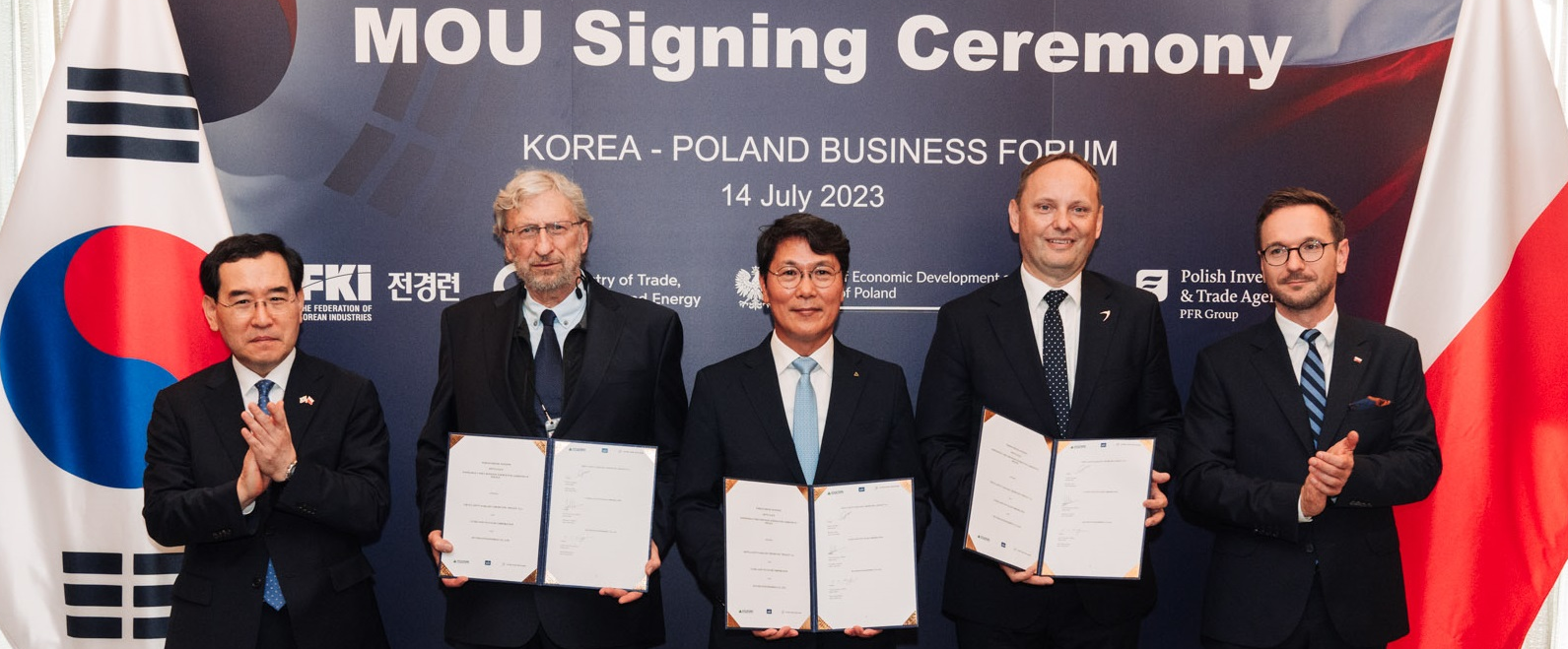
Grupa Azoty Zakłady Chemiczne Police S.A., Ultra Safe Nuclear Corporation (USNC) of the US and South Korea’s Hyundai Engineering Co. Ltd (HEC) today signed a Preliminary Agreement on cooperation in the development of nuclear power in Poland, including Micro-Modular Reactor (MMR) technology.
The parties to the agreement assume close cooperation in the implementation of USNC’s MMR technology in the chemical industry, construction of an energy system based on modular reactors and the use of zero-emission nuclear energy to produce hydrogen.
HEC is an integrator of industrial energy technologies and provides implementation services for energy sources, including small nuclear power plants and their integration with the infrastructure of industrial customers. Together with USNC and other partners, HEC is developing a zero-carbon hydrogen production technology that extracts hydrogen by splitting water using electricity generated from nuclear power. The participation of the Korean partner in the planned investment in Police will therefore be a significant boost for the project.
In the agreement, HEC, USNC and Grupa Azoty Police also expressed their willingness to support each other and commit to the development and implementation of nuclear energy with the main goal of mitigating the adverse effect of climate change.
“The agreement we signed today not only significantly strengthens our project by attracting an experienced partner such as HEC, but also strengthens our works towards implementation of nuclear technologies in chemical industry. Document we signed sets the course of action we intend to take to facilitate the licensing of MMR technology in Poland. Seeking access to zero-carbon energy sources while decarbonising our own generation sources aligns with the Grupa Azoty Group’s Strategy for 2023-2030. Poland’s energy transition is not only about government action, but also about the changes that key Polish manufacturing companies such as Grupa Azoty are undertaking, including replacement of fossil fuels with zero-carbon sources of heat and electricity, gradual reduction of energy consumption or improvement of energy efficiency. The agreement is for us an important step in this direction,” stressed Mariusz Grab, Vice President of the Management Board of Grupa Azoty S.A. and President of the Management Board of Grupa Azoty Police.
USNC is an integrated nuclear company that designs, licenses, produces, builds, develops and operates zero-carbon nuclear power solutions, among other things. The company has developed the Micro-Modular Reactor (MMR) technology using Fully Ceramic Microencapsulated (FCM®) fuel and has obtained patent protection for some of its related technologies.
"This agreement is an important next step toward Poland's energy independence and decarbonization efforts. We appreciate the continued interest and support of Grupa Azoty and our partner Hyundai Engineering Company in deploying USNC's high-temperature nuclear batteries at the Police SA chemical plant. MMR nuclear batteries are an excellent fit for superheated steam and hydrogen production in applications like this around the world.” says Francesco Venneri CEO of USNC.
“Proud to continue the ongoing collaboration with Grupa Azoty Group, a leading player in the Polish fertilizer/chemical industry, and USNC, which possesses outstanding micro modular reactor (MMR) technology. Our company has extensive business experience in Poland. Building upon this experience, we will combine our acquired expertise and capabilities to generate synergistic effects, contributing to the establishment of green energy in Poland.” says HyeonSung Hong CEO of Hyundai Engineering CO., Ltd.
Nuclear power generation is among the objectives of the Zero-Carbon Energy System, which is one of the pillars of Poland’s Energy Policy until 2040. Nuclear power is an efficient, reliable and zero-carbon form of energy and a win-win solution to climate change. MMR technology is the next generation of innovative and scalable nuclear reactors that will offer safety, economic and environmental benefits.